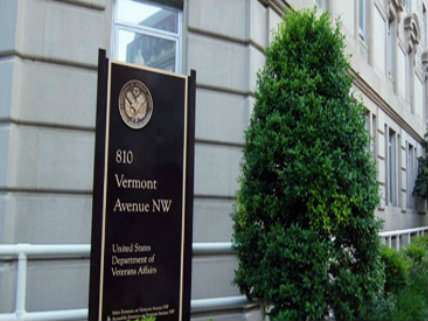The V.A. Wasted $6 Billion a Year Even While Begging for More Money

In the aftermath of a national scandal last year involving mass manipulation of wait times at Veterans Administration (V.A.) facilities, the acting V.A. Secretary, Sloan Gibson, said that what the V.A. really needed to fix the system was more money. Gibson backed a $17.6 billion request for federal funding as necessary to hire 10,000 additional clinicians and set up new facilities and infrastructure in order to meet demand for care and treatment within the system. Wait times would only increase without the money, he argued, and veterans advocates seemed to agree.
President Obama seemed to agree with the basic idea that funding was key to reforming the system. Last August, he signed bill providing some $16.3 billion for the V.A. A White House blog post explained that "the main focus of the new law is to ensure that veterans have access to the care they've earned."
A new report from a senior V.A. official suggests that the V.A. may not have had a funding problem so much as a wasteful spending problem, The Washington Post reports:
The Department of Veterans Affairs has been spending at least $6 billion a year in violation of federal contracting rules to pay for medical care and supplies, wasting taxpayer money and putting veterans at risk, according to an internal memo written by the agency's senior official for procurement.
In a 35-page document addressed to VA Secretary Robert McDonald, the official accuses other agency leaders of "gross mismanagement" and making a "mockery" of federal acquisition laws that require competitive bidding and proper contracts.
Jan R. Frye, deputy assistant secretary for acquisition and logistics, describes a culture of "lawlessness and chaos" at the Veterans Health Administration, the massive health-care system for 8.7 million veterans.
"Doors are swung wide open for fraud, waste and abuse," he writes in the March memo, which was obtained by The Washington Post.
One of the biggest problems mentioned in the memo is the use of purchase cards, which are supposed to be limited to relatively small dollar purchases, but have instead been used to circumvent federal purchasing rules in order to buy multiple billions in medical supplies without any of the usual contracts in place.
Frye isn't the first person to raise some of these concerns; some of the same issues regarding contracting practices have previously been documented by the V.A.Inspector General.
The public disclosure of Frye's memo, which was clearly intended to go outside the V.A.'s chain of command, is likely to give these issues a fair amount of outside attention, but you can't say he didn't try first. According to the Post, Frye's memo "discloses his repeated efforts to raise his concerns with other senior officials at the agency but says he was consistently ignored. He also accuses top agency officials of deceiving Congress when they were asked about questionable practices."
That last bit is important, because, presuming that Frye is on target, what it tells us is that the V.A.'s questionable spending practices weren't just errors or mismanagement; they were intentional deceptions. Which means that the V.A. was spending $6 billion a year in a manner they understood to be dubious, and they tried to cover it up even while begging Congress for more funding to fix a separate problem that also stemmed from internal corruption and deception.


Show Comments (56)